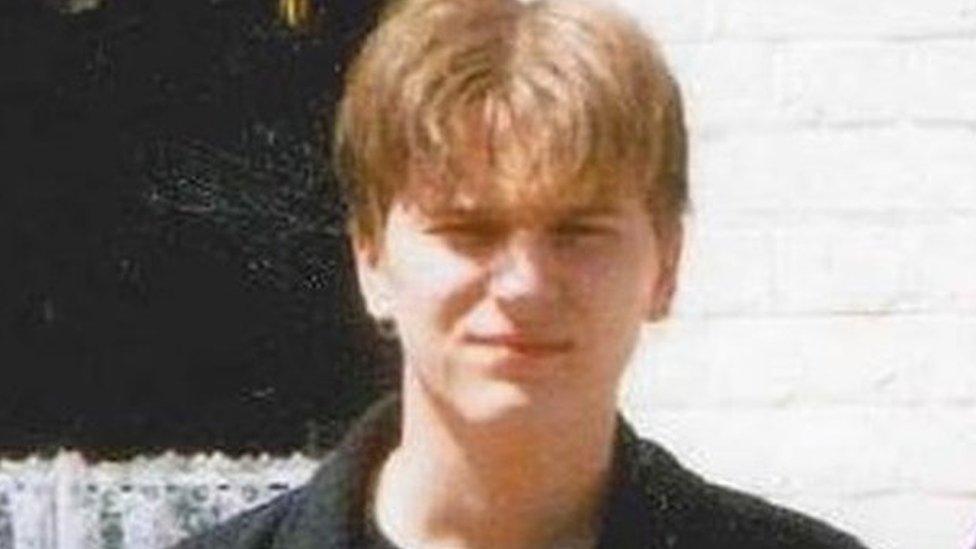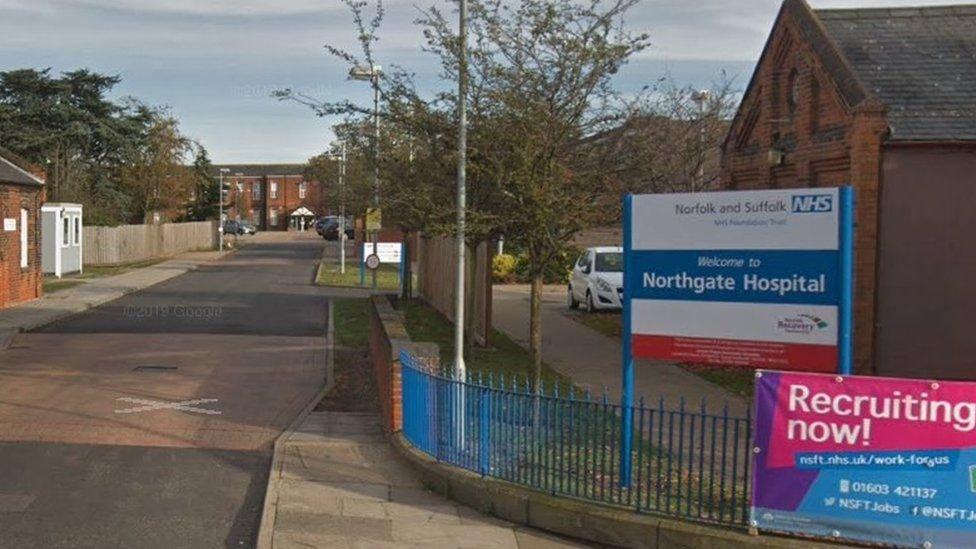Eliot Harris death: Records at Northgate Hospital falsified, inquest told
- Published

The cause of Eliot Harris's death could not be definitively established by a pathologist
Three members of staff at a mental health trust have been sacked after falsifying observation records on the night a patient died, it has emerged.
An inquest jury found the practices at Northgate Hospital in Great Yarmouth were "encouraged" by managers.
Norfolk Coroner's Court recorded an open verdict into the death of Eliot Harris in April 2020.
The Norfolk and Suffolk Foundation Trust (NSFT), which runs the hospital, has apologised to his family.
An inquest into the death of Mr Harris, who lived in Cromer, was told of "chaotic" conditions on the night he died with one nurse describing the ward as "bedlam".
The 48-year-old, who had schizophrenia, was sectioned under the Mental Health Act after he became agitated at his care home and refused to take medication.
He was taken to Northgate Hospital and, after a period in a seclusion room, was transferred to a private room on the ward.
Mr Harris was discovered unresponsive in bed during the early hours of 10 April and pronounced dead half an hour later.

A file was sent to the Crown Prosecution Service over the falsified logs but no further action was taken.
The inquest recorded his cause of death as "unascertained" following a report from Home Office pathologist Dr Nat Cary.
Among the potential causes of death were cardiac arrhythmia brought about by Mr Harris' anti-psychotic medication or diabetic keto-acidosis, though the latter was considered to be highly unlikely.
Staff shortages because of Covid meant members of the trust's crisis team had been asked to work on the ward on the evening in question.
Observations on Mr Harris were supposed to take place four times an hour and this was recorded on ward logs.
But a police investigation found that these did not match CCTV records.
A spokeswoman for the force said: "Police carried out an extensive investigation into the ill treatment/neglect of a person lacking capacity by anyone responsible for that person's care following the death of Eliot Harris at Northgate Hospital in Great Yarmouth between 9 April 2020 and 10 April 2020.
"A file was subsequently sent to the Crown Prosecution Service and they made a decision to take no further action from a criminal perspective. A file was then sent to the Coroner."
The irregularities with Mr Harris's observation records did not contribute towards his death, the court heard.

Analysis by Nikki Fox, BBC Look East Health Correspondent
Even though it cannot be said the culture of falsifying observations at the Norfolk and Suffolk Foundation Trust contributed to the death of Elliot Harris, the events reveal hugely concerning practices.
The Easter of 2020 was a time when Covid was rife, so the trust would have been affected by sickness but the fact the ward had to "borrow" staff from another department shows how stretched the situation was.
Fast forward to November 2021 and the same Northgate Hospital was suspended from taking new admissions by the trust after the health watchdog, the Care Quality Commission (CQC), said they were on the verge of closing it themselves.
Five months later, in April 2022, the CQC said: "The trust was not ensuring staff carried out patient observations in accordance with trust policy and NICE guidance in order to protect people from harm."
Why then were poor recording practices and a failure to conduct observations in the proper way still happening two years after Eliot's death?
That may be one of the reasons why the local health systems in Norfolk and Suffolk have agreed to launch an independent review into deaths associated with the mental health trust.

Cath Byford, NSFT's deputy chief executive, said the level of care Mr Harris received "wasn't good enough and he really was entitled to a better level of care".
"Two years ago the culture was a real challenge on that ward but lots has been done since to address that", she said.
"We have reinforced the importance of safety".
Ms Byford continued: "An investigation took place and immediate action was put in place - really stringent auditing of clinical observations. Not just checking of records but checking of CCTV and speaking to patients.
In preparing a Prevention of Future Death report the Norfolk Coroner Jacqueline Lake said that she still had concerns about the way patients were being checked at the hospital.

Find BBC News: East of England on Facebook, external, Instagram, external and Twitter, external. If you have a story suggestion email eastofenglandnews@bbc.co.uk, external